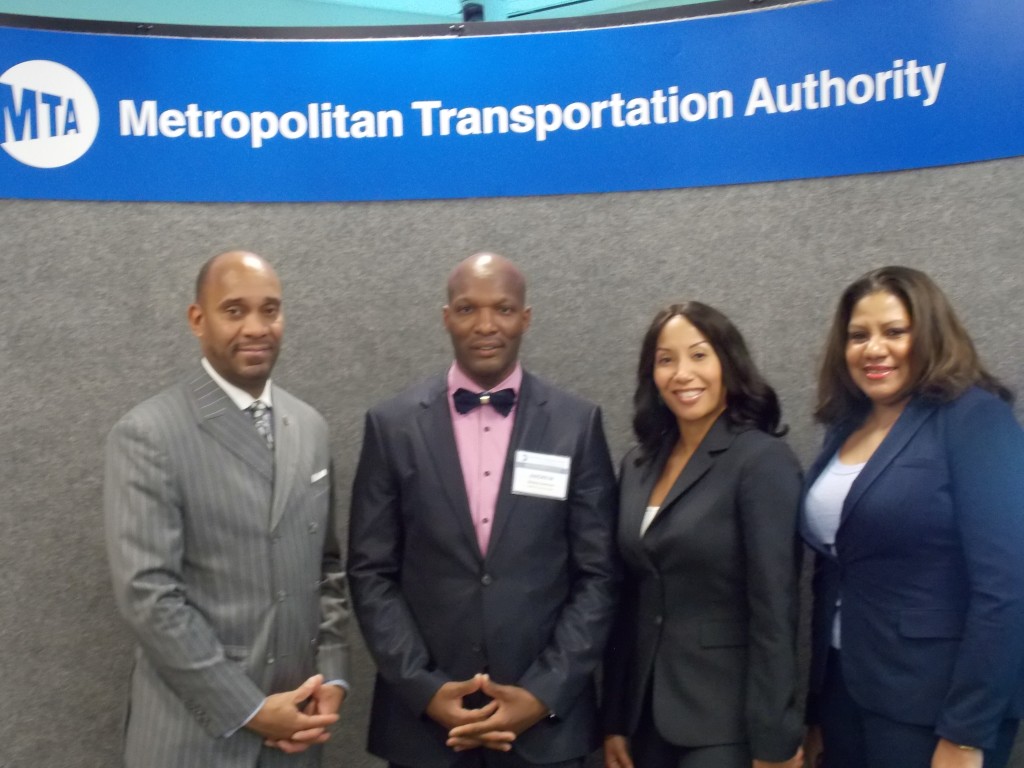On January 30, the Metropolitan Transportation Authority (MTA) awarded 45 small construction companies certificates of completion at their first ever Small Business Mentoring Program (SBMP) graduation.
The SBMP is a two-tier program that provides in-class and on-site training for small construction companies by helping eligible minority, women-owned and disadvantaged businesses become prime MTA contractors and subcontractors.
The first tier takes four years to complete and enables the small business to bid on projects up to $1 million. To complete the second tier, it takes an additional two years allowing businesses to bid on projects valued at $3 million to $5 million.
In addition to being mentored by a larger construction management firm, the participants also receive waived bonding for the first tier. They are also granted access to capital through the program’s partnership with Carver Federal Savings Bank, which is headquartered in Harlem.
Ninth District Councilwoman, Inez Dickens, who is a small business owner in a different industry, praised the program’s partnership because of the financial burden it takes off of families.
“It’s not enough to just have money to open a business.” Dickens said. “The bottom line is you need to have money set aside.”
To Andrew Simmons, class valedictorian and president of Lashay’s Construction and Development Co. Inc., the partnership was critical for his business.
Not only did it help him acquire the contract for the Port Jervis Station Improvement Project, but he is now building a relationship with the bank and has been given a credit line.
Donned as “Mr. Success” during the ceremony, Simmons recounted his earlier days in the business saying “construction is in my blood” because he was brought into the business by his four uncles from down south.
For him, the SBMP was a dream come true.
Though he had worked on notable projects in New York such as the Larchmont Train Station renovation, the SBMP gave him the opportunity to lead, which is an opportunity he hadn’t received before working as a subcontractor.
He said before applying to the program, he lacked the necessary knowledge to serve as the prime contractor. Now having completed the first tier. He not only feels comfortable to lead projects, but he has gained valuable experience in new areas such as electrical work, which helped him on a recent job.
Simmons also said one of the most important lessons he learned through the program was the importance of hiring the right talent to work on projects. He is looking forward to participating in the second tier of the program.
Carmen Bianco, President of the MTA, agrees with Simmons on the necessity to hire capable talent.
In the newly remodeled boardroom, he told the graduates that it is their work that will help MTA progress in the future. They will serve as an integral part of the company ensuring that the 8,000 trains that run daily and 55 bus trips will all run on schedule.
But more importantly, they will be the reason why 8.2 million customers that use MTA daily make it to their destinations safely.
“The infrastructure has to be right every time because they are our moms, dads, sisters, brothers and children.” said Bianco.
He also went on to say that they are onto something like never before, referring to the necessity and quality of the program.
“This is what America is all about in my mind. ” he said.
Chief diversity officer and creator of the program, Michael Garner, said getting to the graduation wasn’t an easy road. He explained when the program was created in 2009, a lot of people didn’t believe that it would work.
In fact, request for the program was denied until the next year when the 2010 Business Diversification Act was passed into law.
During the first operating year of the program, $10 million dollar was allotted. Up until two weeks before the graduation, $140 million was allotted for the program.
“that creates a unique problem for us because we have more product than we have contracts. ” said Garner. “We had to give back $60 million just two weeks ago.”
When asked whether the program works, Garner beamed with pride acknowledging that the program created more than 2,600 jobs since its inception and that the MTA was able to approve 46 loans totaling $5 million dollars.
Also, out of 147 contracts, 101 were awarded to New York State Certified Minority and Women Business Enterprises and MTA certified Disadvantaged Business Enterprises. That represents 69 percent of the total projects awarded through the program.
Moving forward, Garner is urging every small business contractor to apply to the SBMP. In the meantime, he intends to “shake every bush and tree to ensure that the money is put back.”
To qualify for tier one, applicants must have at least two years of business experiences and the ability to provide two references for commercial work. References should reflect each of the trades that the applicant would like to be pre-qualified. Also, projects listed must be valued in excess of $25,000.
To qualify for tier two, you must complete tier one of the program.
However, if you don’t qualify for either tier, you may apply to the MTA Small Business Federal program. To qualify, the business must have successfully completed a four-year mentoring relationship. The program lasts three years and like tier two, allows small contractor business to bid on projects valued up to $3 million.
To qualify, businesses should be in business for at least one year with a net worth not exceeding $1.32 million. They should also be able to provide two references for commercial work, which is valued at less than $500,000 from every trade it wishes to be prequalified.
Applicants may not participate in more than one program at a time.
Applications for the next class are now being accepted. Classes begin March 19 and will be held at MTA headquarters at 2 Broadway.
For more information on the SBMP or to apply, go to web.mta.info/sbdp

